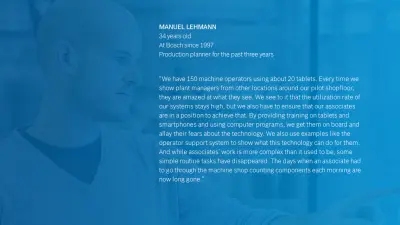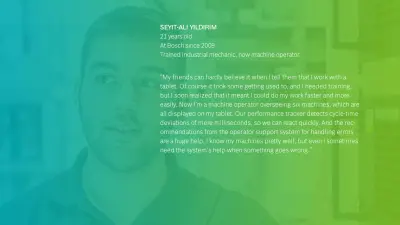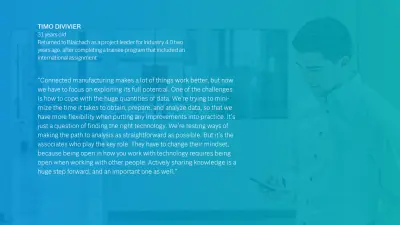A world of data in tablet form
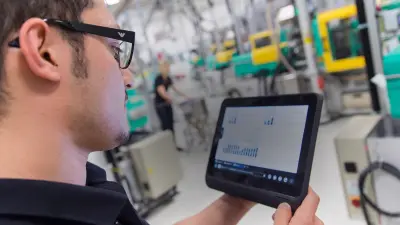
Blaichach, the lead plant for the global manufacturing of ABS/ESP® safety systems, is deeply involved in sounding out the possibilities of connected industry. Yet even in this connected working world, where cutting-edge IT delivers superlative efficiency, the focus is still on people.
How do associates view this change, and how are they trying to shape it?
Blaichach is a hands-on lesson in connectivity
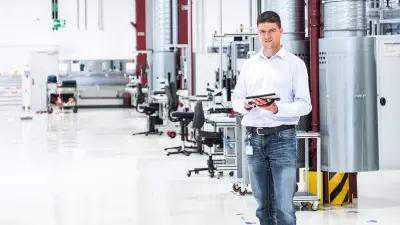
Where production experts used to inspect machines and check parts, tablets have now become the everyday tool to track processes and intervene if necessary. This is the world of the fourth industrial revolution: Industry 4.0. By connecting its operations with the latest in IT, and by digitalizing all its processes in line with the Bosch Production System, the Bosch location has started blazing a trail to the future. As the lead plant for an international network, Blaichach is the perfect choice for this role. Each year, 3,000 associates produce 6.7 million ABS/ESP® safety systems. Different departments work side by side, sharing information and driving further improvements. Industry 4.0 offers plenty of new opportunities for making production more efficient. The wealth of data is something companies need to leverage to their competitive edge. If the analysis is done properly, quality can be assured and the process of monitoring workpieces speeded up. There is also the advantage of a global database to reveal error patterns in production. Blaichach has combined these patterns with experience gained from resolving the errors successfully and developed an operator support system.
6.7 million
ABS/ESP® security systems are manufactured by 3,300 people
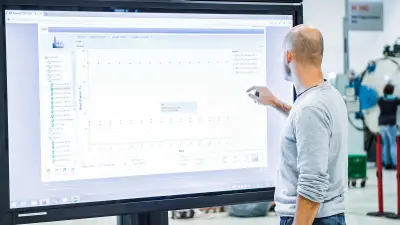
This system not only displays error messages themselves but also tried-and-tested recommendations for dealing with them. Another digital tool, known as the performance tracker, allows experts to keep a watch on cycle times and to intervene early on. In recent years, these advances have made it possible for Bosch to increase productivity at its ABS/ESP® manufacturing facilities worldwide by almost 24 percent. One further advantage is that product quality has been given a new dimension. Data gathered directly from customers can be analyzed and transmitted automatically to manufacturers. Yet the success of the technology depends on people. Their work has changed. They have to work with digital connectivity, understand the technology, and tap the opportunities it offers. People have to interpret the information and make the right decisions. That’s why Blaichach highlights “soft factors” as well. Factors like “rethinking” and “culture change,” or working with technology — an activity that should be as simple as it is effective. Or factors such as the desires and expectations that associates have when it comes to connected manufacturing, which everyone involved now has to fulfill.
Connected Industry Innovation Cluster
In 2015, Bosch pooled its expertise in the area of connected manufacturing in its “Connected Industry” cluster. Even now, some 100 experts from every part of the company work together there. And in many plants, there are also expert groups supporting the innovation cluster with more than 100 pilot projects. At its own plants, Bosch uses the knowledge that has been gained in this way to enhance its Industry 4.0 competitiveness and open up new areas of business. But that is not all. It is also in a position to offer external customers Industry 4.0 solutions. In the area of connected manufacturing, Bosch is both a leading provider and a leading user.
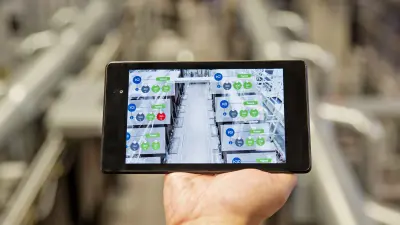
Summary
In Blaichach, Bosch is testing the manufacturing facility of the future. The objective: more efficient production, but also more safety and less hard work for associates.
